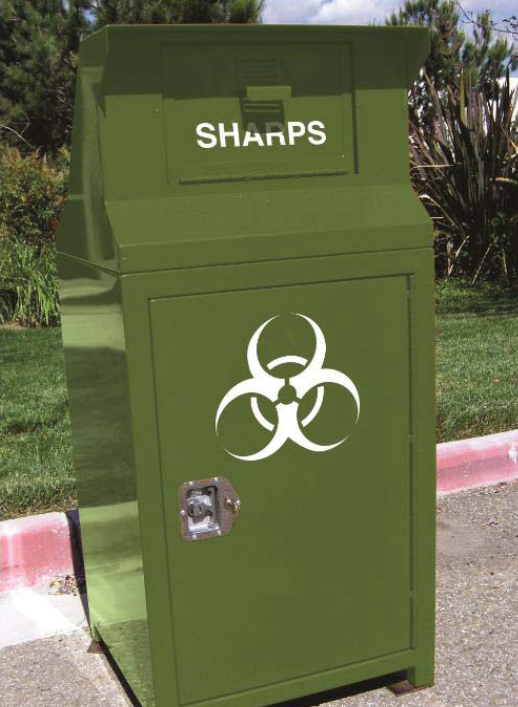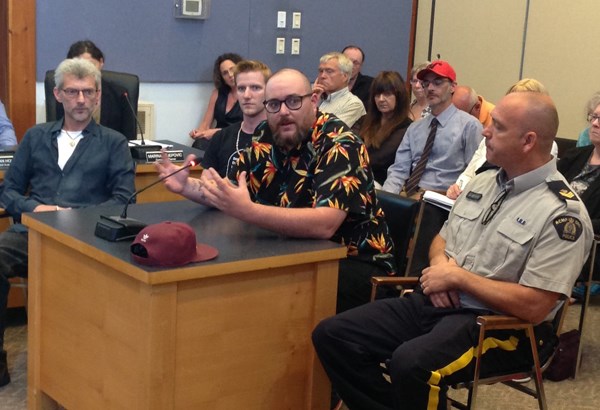The District of Sechelt is spending a little over $6,000 to tackle recent issues around homelessness and drug use in public spaces.
A six-page report prepared by Mayor Darnelda Siegers following meetings involving district staff, RainCity Housing, RCMP, and Vancouver Coastal Health about concerns being raised by community members and downtown merchants, recommended council approve drawing the funds from either the general operating fund or the community safety reserve.
“The District of Sechelt has received many reports from Sechelt residents, business owners, the RCMP, Sechelt bylaw officers and other staff that the number of homeless people in Sechelt has increased dramatically over the past two months. Some of these individuals are local, but many are from off-coast. Some are believed to have mental health and drug addiction issues,” Siegers said in her report.
“The amount of waste from overnight camping and used needles is increasing in the downtown area. Despite escalated efforts across the province, B.C. continues to see record numbers of illicit drug overdose deaths… Three overdose-related deaths have occurred in Sechelt in the past year.”
Council unanimously approved Siegers’ recommendations after hearing from a delegation from RainCity, the Community Action Team (CAT) and RCMP at their July 3 meeting.
Nick Gaskin of RainCity told council that since the organization first came to the Sunshine Coast to manage the shelter in Sechelt about three years ago, the demographics of the homeless population have changed.
“The demographics of homelessness back then were a more senior demographic with alcohol as the drug of choice,” Gaskin said. “Move forward three-and-a-half years later and we’re seeing a slightly younger demographic and we’re seeing a lot more complex drug use, especially around drugs such as heroin, meth and crack cocaine and the associated behaviours and challenges that come from that drug use.”
The Community Action Team’s Kris Verhulst said the group has been laying the groundwork for what they’re calling “Sunshine Coast Connections,” a downtown office with central phone number and email that will give the community a way to voice concerns and the CAT a way to respond, but can’t continue the work until their funding is renewed by the province.
Sunshine Coast Connections would include peer workers who could provide education on drug use, how to dispose of needles, keeping the community safe and how to access shelter and support services as well as treatment and recovery.
“The advantage is that most of the time those [peers] personally know a lot of the homeless people on the street, so the interaction is completely different from when someone from the RCMP has to show up to mediate or clean up,” Verhulst said.
Verhulst said Sunshine Coast Connections would also act as a clearing house for dealing with community concerns and give residents a more productive option for voicing those concerns than posting rants on social media.
“If people have the feeling they’re not excluded, everything happens on a more amicable basis. The moment somebody feels they have a complaint about drug use in the community and they have nowhere to go, what happens is they go on Facebook and they fire off a rant and everybody jumps in on it and it’s not helping anybody,” said Verhulst.
RCMP Sgt. Don Newman said there’s little police can do when it comes to preventing homeless people from camping in public spaces downtown, as long as it’s overnight. He also said the local detachment is in full support of the Sunshine Coast Connections plan. “Homelessness isn’t a crime… I believe this is a very well thought out and a very inexpensive way to address the next four to six weeks” until the CAT funding is renewed, Newman said.
“As the mayor I’ve been getting calls and emails, I’ve had meetings with people in the community, business owners and residents as have the RCMP and RainCity. The [Trail Bay] Mall is represented here [tonight], they’re having issues as well. It seems to be centred around our downtown core,” Siegers said. “What we’re hearing from the community is they need some avenue to be able to know that somebody’s dealing with it, looking at the issue and being proactive.”
Of the $6,100 in spending approved by council July 3, $2,000 will go to support the CAT’s effort to hire peer support workers while it awaits word on renewed funding.
The biggest chunk of the money, up to $3,000, will be used to by the district to buy a specialized needle disposal bin and $600 more will pay for a portable toilet and garbage bin to be placed with the needle bin “in an area where needle disposal has been problematic in Sechelt.”
Vancouver Coastal Health’s needle exchange program is also promising to install new needle disposal bins at the heath unit offices in Sechelt, Gibsons and Pender Harbour.
As well as the funding for the peer support workers and needle disposal bin, the district will spend around $500 “to increase the public awareness of the cleanup and education services to be provided by RainCity staff and peer support workers and to publicize the dedicated phone line and email address.”




